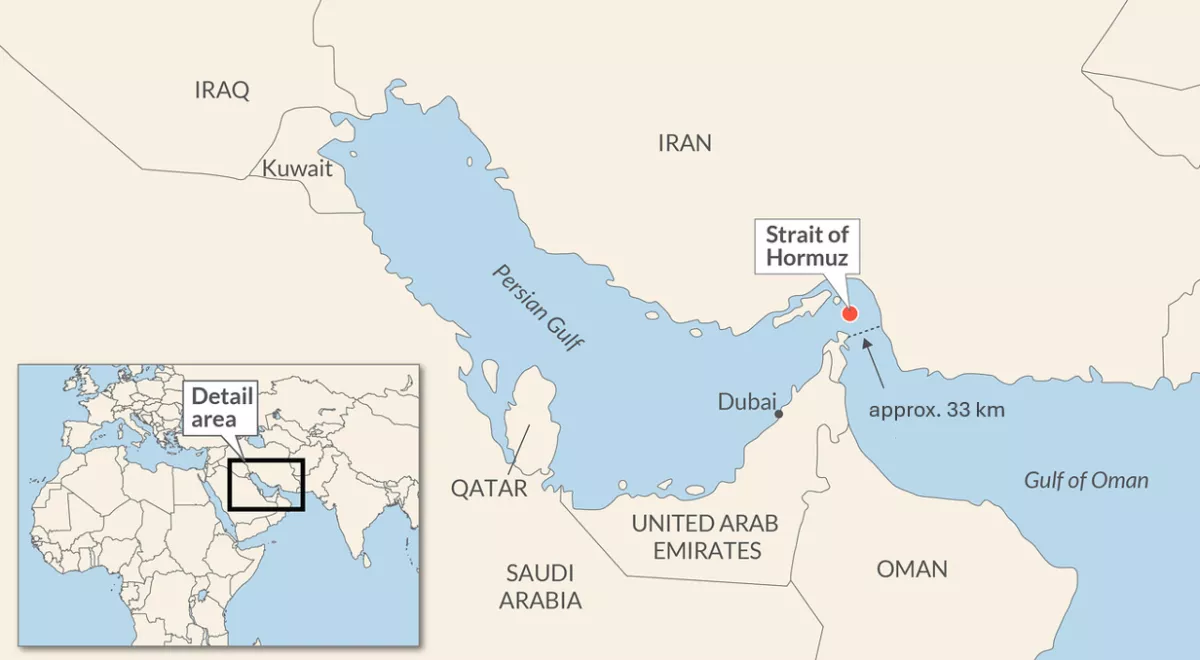Tehran's friends, foes alike to be impacted by potential closure of Strait of Hormuz
The consequential US air strikes on three major nuclear facilities in Iran on June 22 has once again drawn global attention to the Strait of Hormuz — a vital maritime corridor responsible for transporting roughly 20% of the world’s oil supply. Iran, which has previously threatened to block the strait amid Israel's ongoing military campaign, responded to the latest strikes with fresh warnings. Hossein Shariatmadari, representative of Iran’s Supreme Leader Ayatollah Ali Khamenei, has reportedly called for swift retaliation for the US strikes, including the closure of the Strait to American, British, German, and French vessels.
The Strait of Hormuz lies between the Persian Gulf and the Gulf of Oman and serves as the sole maritime outlet from the Gulf to the open ocean. It is regarded as one of the most crucial strategic choke points in the world. Key oil-producing nations including Saudi Arabia, Iraq, the United Arab Emirates, and Kuwait rely heavily on the Strait to export their crude oil.
Measuring only 33 kilometers at its narrowest, the passage carries around 20 million barrels of oil and oil products daily — nearly a fifth of global oil trade. Additionally, one-third of the world’s liquified natural gas (LNG) also passes through this narrow waterway.
Due to its immense strategic significance, the strait is heavily monitored by the US Navy’s Fifth Fleet, based in Manama, Bahrain. Any disruptions or even temporary closures of this maritime artery could spark immediate and widespread shocks in global oil markets, triggering price volatility across the world.

Key considerations impacting Iran's decision
The Strait of Hormuz has been a long-standing flashpoint for regional tensions. Now, following joint Israeli and American airstrikes on Iran’s military and nuclear infrastructure, Tehran has once again raised the threat of shutting down this critical waterway. Yet the central question remains: will Iran act on this threat, or is it leveraging the strait as a geopolitical bargaining chip, using global fears of oil disruptions as strategic pressure against both allies and adversaries?
Despite its rhetoric, an article by Mint suggests that a full-scale closure by Iran may not actually materialize, putting forward three considerations why Iran might hesitate to follow through on its threat.
First, such a move would hurt Iran’s top ally and trading partner — China. As the world’s second-largest economy and largest importer of oil, China receives nearly three-quarters of Iran’s oil exports. A closure of the Strait would severely disrupt Chinese oil shipments, and Beijing would likely use its considerable economic leverage to dissuade Tehran from any actions that would destabilize this critical supply route.
Second, closing the Strait would strain Iran’s regional ties, especially with Oman, which controls the southern half of the waterway. Iran has invested significant diplomatic effort in building a cooperative relationship with Oman, relying on the country in various areas, including backchannel diplomacy. Oman has consistently advocated for the freedom of navigation in the region. Additionally, Iran risks damaging its improving relationships with the Gulf Cooperation Council (GCC) states, where a recent détente has helped ease years of tension.
Third, from a domestic perspective, such a dramatic action could backfire economically and politically. Any blockade or disruption of Iran’s own oil exports would likely lead to a spike in global oil prices, which in turn could spark inflation and public discontent within Iran. Such unrest could destabilize the fragile internal balance and hinder reformist momentum under President Masoud Pezeshkian, who already faces significant challenges in managing the country’s socio-economic strains.
In the current crisis, should Iran move to block the Strait, it is China — as the largest importer of Iranian oil — that stands to suffer the most. Given the deep interdependence between the two countries, Beijing may act to restrain Tehran from pursuing any action that jeopardizes its own economic interests. A significant disruption in global oil supplies would hit China’s industrial output and energy security, making restraint the likeliest path forward.
India caught in crossfire of allies
Meanwhile, India is also watching developments anxiously as approximately two-thirds of it's oil imports and nearly half of its LNG imports pass through the Strait of Hormuz. A blockade would severely disrupt India’s energy supply, particularly in the LNG sector, as it heavily relies on exports from Qatar and the UAE. The situation places India in a difficult diplomatic position, as it tries to balance its strategic ties with Israel in defense, intelligence, and technology, while maintaining a functional relationship with Iran.
Precautions for uncertain future
In the meanwhile, Turkish Minister of Transport and Infrastructure Abdulkadir Uraloğlu has already announced that Türkiye is taking strategic measures in anticipation of a possible closure of the Strait of Hormuz by accelerating its investment in key logistics initiatives such as the "Middle Corridor" and the "Development Road".
By Nazrin Sadigova








